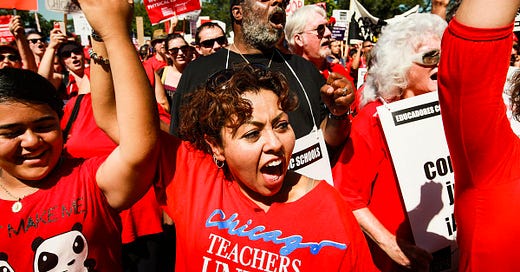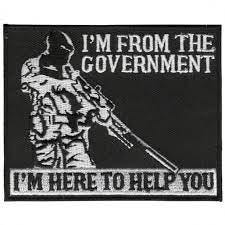Throughout history, people have sought out ways to commandeer the power of government to gain wealth and power. “Vote for me,” the politicians say, “and I will give you money, or protect you from competition, or cancel your debt!” And of course the voters give in, thus perpetuating a system of redistributing money and power to special interest groups, while their elected leaders bask in adulation. It is undiluted, raw greed, pure and simple.
But the worst of the worst is public sector labor unions. When I first heard of them, at a young, naive, impressionable age, I thought: that makes no sense! The unions and leftist-liberal politicians (who have no skin in the game) would easily team up to fleece taxpayers. With pro-union advocates on both sides of the bargaining table, what’s to stop them from making, and getting, infinite demands? Answer: nothing.
A recent article in the Wall Street Journal brought this ugly picture to public attention. Philip Howard, 74, a lawyer and writer, has studied the problem for decades and written a book entitled “Not Accountable: Rethinking the Constitutionality of Public Employee Unions.” The WSJ writer reviewed the book and interviewed the author. As bad as one may think the problem is, Howard’s book points out: it’s much worse. Public sector unions are designed for inefficiency, he explains in detail. Howard is pursuing legal channels to curb their power. He says that public unions “rob elected officials of their governing power and thus violate the Constitution’s mandate that states have a republican form of government.”
Let us back up a bit on this topic of labor unions. We libertarians maintain that a person has a human and Constitutional right to join a union, if they choose. And employers have a right to negotiate with unions, if they choose. Similarly, employees have a right to not join a union, if they so choose. And employers have a right to not negotiate with unions, if they so choose.
Pretty basic stuff - but of course government had to throw a monkey wrench into this otherwise private arrangement between employers and workers. According to the National Labor Relations Act of 1935, signed into law by Franklin Roosevelt, employers are compelled to deal with unions, like it or not. What could possibly go wrong?
Now to be fair, businesses have lots of governmental edicts and bennies that favor them, at the expense of workers. The list includes subsidies, bailouts, and all manner of laws whose purpose is to stifle competition. All this government meddling has the end effect of constraining and impeding businesses that would otherwise create more jobs, thus increasing the demand for labor.
I’ve always found it befuddling that some industries tend to be heavily unionized, and others not. I spent my career as a software developer. This is a highly stressful occupation, requiring impressive professional credentials, where we must constantly balance competing demands between the various stakeholders, all the while constantly having to re-train ourselves to the latest technology, which can radically change overnight. Oh and did I mention that the companies we worked had this never-ending tendency to downsize? Or fail? Yet “unionize” was never a word we heard.
At the other end of the spectrum, why is it that actors, entertainers, and musicians are always unionized? Here is an industry where the “laborers” truly love their work and routinely get rousing applause from adoring fans, while the wanna-be’s line up for miles. If asked, the unionized entertainer would mumble something along the lines of “I don’t want to get cheated, man!” Geez.
But at least with private-sector unions, there is a mutual understanding that infinite demands won’t fly. If the business does not make a profit, then everybody loses their job. But with public-sector unions, no such limit exists. And even if the public official in charge of signing off on the union demands feels that this is unjustified extortion, by law, they still must negotiate with them, else a strike will ensue. Which basically means: what the union wants, the union gets. This is greed personified. No way to sugar-coat it.
From a libertarian perspective, the ultimate solution really is to not even have a public sector. I have addressed this topic before. Consumer needs like education and transportation - where a lot of the public unionization occurs - can better be handled by the free market.
In the meantime, good for Mr. Howard! His legal case will definitely be one to follow with anticipation. Stay tuned.










Because states and cities don't print their own currency, they are at least somewhat restricted in how much they can give away to the public employee unions. That hasn't stopped grossly negligent Illinois (and others) from incurring massive unfunded liabilities for public employee pensions. Illinois' unfunded liability alone is over a half TRILLION dollars. Nationally, the total is 8.6 trillion.
But public employees aren't worried in the least about this. They know who controls Washington, and Washington won't let them down.
https://www.thecentersquare.com/illinois/alec-illinois-unfunded-pension-liability-533-billion-8-2-trillion-nationwide/article_9be17510-e835-11ec-8a8c-575a2285a988.html